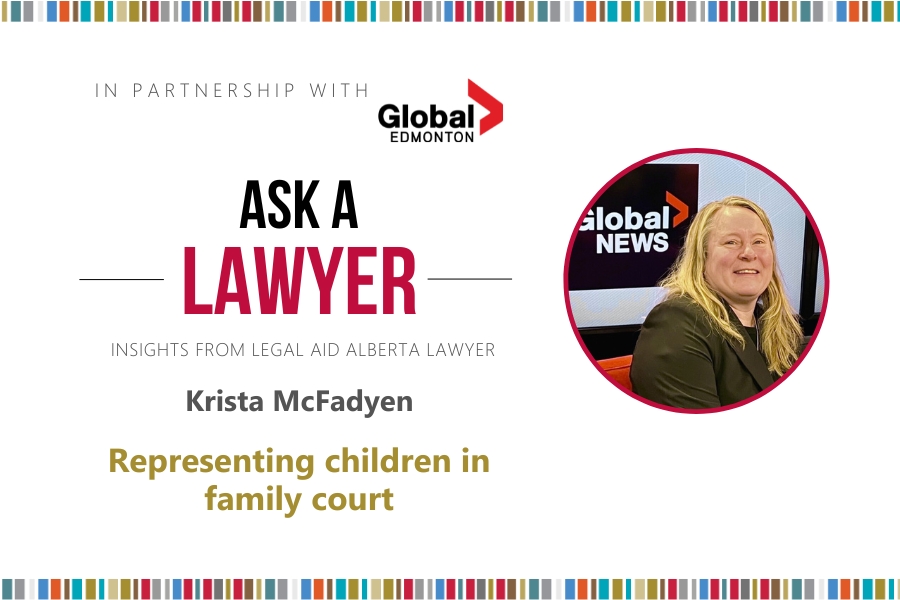In high-conflict family cases, child representation is vital
In family breakups, especially when parents are at an impasse, it is important that the voices of children are heard. Legal Aid Alberta lawyers are highly skilled in child representation.
LAA staff lawyer Krista McFadyen appeared on the Global News Morning Ask A Lawyer segment to shed light on this important area of law.
View the segment (transcript below):
Daintre Christensen: In high conflict family disputes, parents and guardians are at the forefront, but who protects the kids? Here today we speak about the ins and outs of representing children in family court. We have Legal Aid Alberta staff lawyer Krista McFadden. Welcome, Krista.
Krista McFadyen: Thank you. Happy to be here.
Daintre: Tell us, when would there be a time when a lawyer would represent a child
Krista: Well, anytime children’s interests are engaged in court. The legal test for family matters is “best interests of the child,” so child counsel brings as much information to families and to the court to represent their interests when families are going through transitions. Generally, whenever a child’s interests are at play, we bring that information forward.
Daintre: So would there be a lawyer representing one of the parents or guardians, a lawyer representing the other side, and one representing the child?
Krista: We often see that. Sometimes it varies. There’s a lot of self-representation in courts, but we do often see lawyers representing each of the parents or guardians and then for the children as well. The age range we usually see is about 5 or 6 as the youngest, and then right up to 17 and 18. When they are so young as 5 or 6, we take a different approach with those kids. We take what we call “interest and entitlements” and get as much information to represent their interests as we can. When they are a little bit older and have a little bit more experience, we take their instructions. So it’s an instructional approach that we take and bring their direct instructions to the family and to the courts.
Daintre: How do you go about with someone as young as five years old? What kind of training do you have?
Krista: We do have specialized training, and we have an expectation to keep that training up. We look at how to reduce trauma. Family transition always incites a bit of trauma for the kids, so we try to reduce that as much as possible. We learn how to do activities to engage kids, make them feel safe, and get them really sharing about their world. For both the young kids and the older kids, we always explore their larger world. So we’ll talk to people that are important to them, like teachers or therapists. Our objective is to bring as much information as we can about the child and their world to the families and to the courts.
Daintre: When you’re in court, is there any special preparation for children when you’re representing them beforehand?
Krista: We don’t bring children into court. We bring their voice through us, the lawyers. We do have some special techniques; it’s almost like a translation. We might be playing Lego or coloring with the child and learning about their world. When we get into court, we’re speaking about the legal test of the best interests, and it’s sort of a translation.
Daintre: There is a virtual session coming up. Tell us a little about that.
Krista: On February 7th, Legal Aid will have a panel of their child representation lawyers speaking about representing children and the positive outcomes that can come about when children have a voice in their legal matters.
Daintre: Based on your experience, do judges put a lot of weight on the child’s wants and needs
Krista: When they’re younger, it’s really about bringing more information to the family and to the courts about what would assist in the family transition. We’re careful; the guardians have the ultimate decision. It’s not just what the children say, but certainly their voice becomes more influential as they grow older. Again, it’s just giving more information to give the court some idea of what is in their best interests.
Daintre: Thank you so much, Krista, for coming in today. We appreciate you helping us understand more about children and the law and representing children in high conflict family cases. You can join Legal Aid Alberta for the free virtual discussion on the ins and outs of children’s rights when it comes to family legal matters. That’s happening February 7th from noon till 1. You can register today at legalaid.ab.ca/events.


